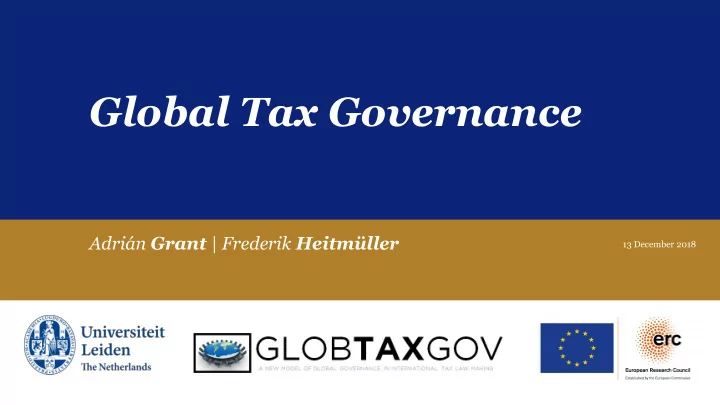

Global Tax Governance Adrián Grant | Frederik Heitmüller 13 December 2018
Index • Introduction • OECD BEPS Project • Legal transplants • GLOBTAXGOV research plan • Conclusions 2
1. Introduction Global tax governance “Global tax governance […] consists of the set of institutions governing issues of taxation that involve cross-border transactions or have other international implications .” (Dietsch & Rixen, 2016) Current model • Double tax treaties OECD • • BEPS • UN? Other actors? 3
2. OECD BEPS Project Description & Objectives International framework to combat tax avoidance by multinational enterprises ("MNEs") using base erosion and profit shifting tools. Objectives: • Close tax loopholes Increase revenue after economic crisis • • Consolidate hegemony of OECD 4
2. OECD BEPS Project Minimum standards Inclusive framework includes non-OECD countries. Members of the IF commit to these measures: • Action 5: Harmful Tax Practices • Action 6: Treaty Abuse • Action 13: Transfer Pricing Documentation • Action 14: Dispute Resolution 5
3. Legal transplant • Importing foreign institutions to produce social change • Influence of - political system - legal system - geography - structure of economy - culture 6
International level OECD BEPS Action plan National law National level Comply Businesses
International level OECD BEPS Action plan National law National level Comply Businesses
International level BEPS Inclusive OECD Framework IMF BEPS Action Regional Worldbank plan cooperation NGOs Academics Other Other countries countries Policymakers Bilateral tax Judges Parliaments treaties National Jurisprudence law National level Tax Administrations Comply Business associations / CEO groups Tax advisors – lawyers - accountants Media Businesses
International level BEPS Inclusive OECD Framework IMF BEPS Action Regional Worldbank plan cooperation NGOs Academics Other Other countries countries Policymakers Bilateral tax Judges Parliaments treaties National Jurisprudence law National level Tax Administrations Comply Business associations / CEO groups Tax advisors – lawyers - accountants Media Businesses Structure of economy (Tax) Culture
International level BEPS Inclusive OECD Framework IMF BEPS Action Regional Worldbank plan Development cooperation cooperation organizations NGOs Academics Other Other countries countries Policymakers Bilateral tax Judges Parliaments treaties National Jurisprudence law National level Tax Administrations Comply Business associations / CEO groups Tax advisors – lawyers - accountants Media Businesses Structure of economy (Tax) Culture
International level BEPS Inclusive OECD Framework IMF BEPS Action Regional Worldbank plan Development cooperation cooperation organizations NGOs Academics Other Other countries countries Policymakers Bilateral tax Judges Parliaments treaties National Jurisprudence law National level Tax Administrations Comply Business associations / CEO groups Tax advisors – lawyers - accountants Media Businesses Structure of economy (Tax) Culture
International level BEPS Inclusive OECD Framework IMF BEPS Action Regional Worldbank plan Development cooperation cooperation organizations NGOs Academics Other Other countries countries Policymakers Bilateral tax Judges Parliaments treaties National Jurisprudence law National level Tax Administrations Comply Business associations / CEO groups Tax advisors – lawyers - accountants Media Businesses Structure of economy (Tax) Culture
International level BEPS Inclusive OECD Framework IMF BEPS Action Regional Worldbank plan Development cooperation cooperation organizations NGOs Academics Other Other countries countries Policymakers Bilateral tax Judges Parliaments treaties National Jurisprudence law National level Tax Administrations Comply Business associations / CEO Tax advisors – lawyers - groups accountants Media Businesses Structure of economy (Tax) Culture
International level BEPS Inclusive OECD Framework IMF BEPS Action Regional Worldbank plan Development cooperation cooperation organizations NGOs Academics Other Other countries countries Policymakers Bilateral tax Judges Parliaments treaties National Jurisprudence law National level Tax Administrations Comply Business associations / CEO groups Tax advisors – lawyers - accountants Media Businesses Structure of economy (Tax) Culture
3. Legal transplants – some hypotheses • Difference between countries - Structure of economy (FDI recipient or exporting, FDI intensity, MNE headquarters, importance of sectors) - Level of development - Political system (influence of parliament and interest groups) Genschel/Seelkopf 2016 - • Differences within countries 16 16
4. GLOBTAXGOV research plan Assessment of the current global tax governance model 3 Sub-questions: • Why are these countries participating in the BEPS Project? • How will the BEPS minimum standards be transplanted into the tax system of these countries? • How can the differences in tax systems and tax cultures of these countries influence the content of these minimum standards? 17
4. GLOBTAXGOV research plan Countries to analyze 18
4. GLOBTAXGOV research plan Criteria for choosing these countries: 1. Location 2. Legal system 3. Economy 4. BEPS commitment 5. Membership 19
4. GLOBTAXGOV research plan Work plan: 1. Desk research (legal transplants, country particularities) 2. Interviews (tax professionals, tax authorities, scholars, etc.) 3. Surveys 4. Workshops 20
Dankuwel. Thank you. Gracias. Merci. 21
Recommend
More recommend